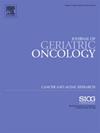老年癌症患者营养干预的系统评价:证据综合和未来研究重点。
IF 3
3区 医学
Q3 GERIATRICS & GERONTOLOGY
引用次数: 0
摘要
老年癌症患者(65岁及以上)是一个不断增长的人群,他们有独特的营养和治疗相关问题,加速了衰老。营养干预可以减轻癌症患者的营养下降、肌肉损失以及营养不良和肌肉减少症的风险,但对老年癌症患者的证据有限。本系统综述的目的是评估营养干预对老年癌症患者营养状况、体重/成分和临床结果的影响,并确定未来的研究重点领域。材料与方法:系统检索自建校至2024年1月的三个数据库。符合条件的研究是随机对照试验(RCT),评估老年癌症患者的营养干预,报告营养相关和临床结果。纳入老年患者的研究以平均年龄≥65岁确定,误差为平均年龄≥60岁。提取各组间营养和临床结果的差异。结果:本综述纳入了11项研究,描述了9项随机对照试验。三项试验特别纳入了65岁及以上的患者。大多数干预措施旨在通过混合癌症类型和治疗方法降低营养不良风险,一项试验旨在减少治疗后的合并症。饮食摄入(n = 4)、营养状况(n = 1)、体重(n = 5)和肌肉质量(n = 3)的变化报告不一致,但初步证据表明,口服营养补充剂(ONS)的饮食咨询改善了胰腺癌患者的体重维持。关于营养干预对治疗耐受性或生活质量的益处的证据有限。方法学设计的异质性发现,包括饮食处方、咨询频率和结果报告,抑制了对老年癌症患者的循证建议。讨论:针对老年癌症患者独特的营养相关问题而设计的营养干预措施是一个明确的研究重点。专门针对治疗后的老年患者的研究是有限的,在此期间,治疗相关的副作用仍然发生。为了支持不断增长的老年癌症患者,未来的研究必须一致地报告饮食处方,坚持营养要求,明确定义的营养相关参数和老年患者特有的临床结果。本文章由计算机程序翻译,如有差异,请以英文原文为准。
Systematic review of nutrition interventions in older patients with cancer: A synthesis of evidence and a future research priority
Introduction
Older patients with cancer (65 years and older) are a growing population with unique nutrition-and treatment-related issues that accelerate aging. Nutrition interventions attenuate nutritional decline, muscle loss, and risk of malnutrition and sarcopenia in patients with cancer, however the evidence for older patients with cancer is limited. The aim of this systematic review was to evaluate the efficacy of nutrition interventions on nutritional status, body weight/composition and clinical outcomes in older patients with cancer and to identify future research priority areas.
Materials and Methods
Three databases were systematically searched from inception until January 2024. Eligible studies were randomised controlled trials (RCT) evaluating a nutrition intervention in older patients with cancer that reported nutrition-related and clinical outcomes. Studies including older patients were determined by the mean age ≥ 65 years with the error to the mean > 60 years. Between-group differences in nutritional and clinical outcomes were extracted.
Results
Eleven studies describing nine RCTs were included in this review. Three trials specifically included patients 65 years and older. Most interventions intended to reduce malnutrition risk across a mix of cancer types and treatments, and one trial was designed to reduce comorbidities after treatment. Changes in dietary intake (n = 4), nutrition status (n = 1), weight (n = 5), and muscle mass (n = 3) were inconsistently reported, but preliminary evidence showed dietary counselling with oral nutrition supplements (ONS) resulted in improved weight maintenance in patients with pancreatic cancer. There was limited evidence of a benefit from nutrition interventions on treatment tolerance or quality of life. The heterogeneous findings in methodological design, including dietary prescription and frequency of consultations and reporting of outcomes, inhibits evidence-based recommendations for older adults with cancer.
Discussion
Nutrition interventions designed specifically to address nutrition-related issues unique to older patients with cancer is a clear research priority. Research specifically targeting older patients post treatment, a period during which treatment-related side effects still occur, is limited. To support the growing population of older patients with cancer, future research must consistently report the dietary prescription, adherence to nutritional requirements, and clearly-defined nutrition-related parameters and clinical outcomes that are specific to older patients.
求助全文
通过发布文献求助,成功后即可免费获取论文全文。
去求助
来源期刊

Journal of geriatric oncology
ONCOLOGY-GERIATRICS & GERONTOLOGY
CiteScore
5.30
自引率
10.00%
发文量
379
审稿时长
80 days
期刊介绍:
The Journal of Geriatric Oncology is an international, multidisciplinary journal which is focused on advancing research in the treatment and survivorship issues of older adults with cancer, as well as literature relevant to education and policy development in geriatric oncology.
The journal welcomes the submission of manuscripts in the following categories:
• Original research articles
• Review articles
• Clinical trials
• Education and training articles
• Short communications
• Perspectives
• Meeting reports
• Letters to the Editor.
 求助内容:
求助内容: 应助结果提醒方式:
应助结果提醒方式:


